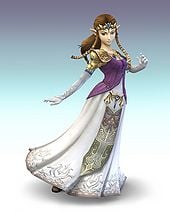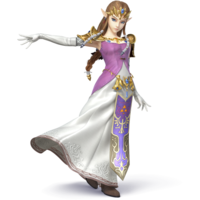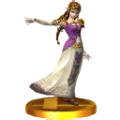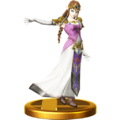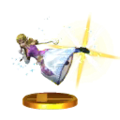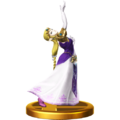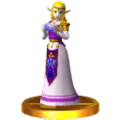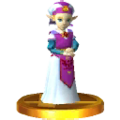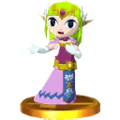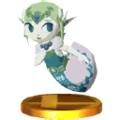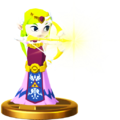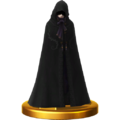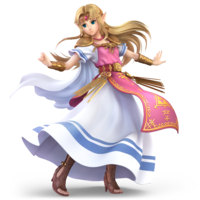Princess Zelda
- For fighter info, see Zelda (SSBM), Zelda (SSBB), Zelda (SSB4), and Zelda (SSBU).
- "Zelda" redirects here. For the universe, see The Legend of Zelda (universe).
| Princess Zelda | |
|---|---|
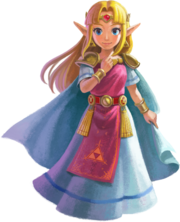 
Official artwork of Princess Zelda from The Legend of Zelda: A Link Between Worlds. | |
| Universe | The Legend of Zelda |
| Debut | The Legend of Zelda (1986) |
| Smash Bros. appearances | Melee Brawl SSB4 Ultimate |
| Most recent non-Smash appearance | Hyrule Warriors: Definitive Edition (2018) |
| Console/platform of origin | Nintendo Entertainment System (Famicom Disk System) |
| Species | Hylian |
| Gender | Female |
| Place of origin | Hyrule |
| Created by | Shigeru Miyamoto Takashi Tezuka |
| English voice actor | Brandy Kopp (Ultimate, World of Light opening) |
| Japanese voice actor | Jun Mizusawa (Melee/Brawl/SSB4) Ayumi Fujimura (Ultimate) |
| Article on Zelda Wiki | Princess Zelda |
Princess Zelda (ゼルダ姫, Princess Zelda) is the titular character of The Legend of Zelda series by Nintendo. Unlike the majority of Nintendo characters, there are several, distinct incarnations of Princess Zelda seen throughout The Legend of Zelda series. Regardless, most share the same status as the crown princess of Hyrule, the setting for the vast majority of the series. Other hallmarks shared by the Zeldas are their possession of both inherent magical abilities and the Triforce of Wisdom, although these are not depicted universally. While earlier games depicted Princess Zelda as a damsel-in-distress, a number of modern games have depicted her as an ally, companion, and sometimes love interest to the series' protagonist, Link.
Zelda made her Super Smash Bros. debut in Super Smash Bros. Melee, and has been a playable character in every installment since.
Character description
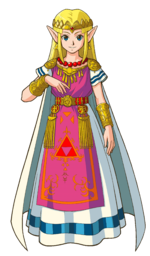
Princess Zelda's first appearance was in The Legend of Zelda on the NES, where she served as the damsel-in-distress for Link to rescue from the evil monster known as Ganon. She has appeared in some capacity in every installment of The Legend of Zelda series, with the exception of Link's Awakening, where she is only mentioned briefly, and Tri Force Heroes, where she is referenced via an outfit. While she has typically assumed this role in subsequent games, modern depictions of Zelda have seen her assume an active role in Link's final battles. Notable examples include The Wind Waker, Twilight Princess, Spirit Tracks and Breath of the Wild.
It is worth noting that while there have been multiple games within The Legend of Zelda series, it has not always been the same Princess Zelda who appears in each installment, with this same notion being shared with Link. This is evident with the fact that there are multiple timelines within the series, wherein many games typically feature a new Zelda. By extension, Zelda's age has varied across the series: she appears as a young girl in some games, and as a teenager or young adult in others. Ocarina of Time noticeably featured Zelda being portrayed as both a child and an adult in the same game. She is generally depicted as having blonde hair, although Twilight Princess portrays her as a brunette, and blue eyes, again with exceptions like in Twilight Princess, where her eyes are a lighter, almost grayish shade of blue, in Breath of the Wild, where she is instead portrayed with green eyes, and many of her "toon" designs such as in The Wind Waker, where she simply has black pupils. Zelda's dress is often portrayed as having elaborate designs, and is predominantly colored pink or purple combined with white and occasionally gold, although she also wears a simple blue dress in A Link to the Past, white, robe-like dresses in Skyward Sword and Breath of the Wild, and a blue tunic with black pants combination as well as a dark blue dress with gold trim in Breath of the Wild. Her footwear varies between heels (for her Ocarina of Time design), boots (for her Twilight Princess and Breath of the Wild designs), and sandals (for her A Link to the Past/A Link Between Worlds, Skyward Sword, and Breath of the Wild designs). She is also occasionally seen wearing a cape, like in A Link to the Past and A Link Between Worlds. Skyward Sword, on the other hand, is the only game where Zelda herself is not a princess, due to Hyrule's royalty not yet being established during the game's events, but rather the physical embodiment of the goddess Hylia, who chooses Link as her hero in this game.
Zelda's first playable appearance occurred in the Philips CD-i The Legend of Zelda games, which are infamous for their non-canonical status and poor quality. Her first playable appearance in an official Nintendo game was Super Smash Bros. Melee, and she would later become playable in a proper mainstream Zelda game, The Legend of Zelda: Spirit Tracks.
In Super Smash Bros.
While Zelda herself makes no appearances in Super Smash Bros., she is nevertheless referenced due to The Legend of Zelda, The Legend of Zelda: A Link to the Past, and The Legend of Zelda: Ocarina of Time being mentioned.
In Super Smash Bros. Melee
As a playable character
The incarnation that appears is from The Legend of Zelda: Ocarina of Time. However, due to the GameCube's improved graphics, Zelda's design in this game is far more detailed than in the game her design is based on. Like her fellow series representatives Link and Ganondorf, Zelda is a slow, but powerful character. However, she deviates from them by being a lightweight whose moveset almost entirely consists of magical attacks, three of which are based on spells used by Link in Ocarina of Time. Her neutral special move is Nayru's Love, which emits a crystalline barrier that deals damage and offers protection. Her side special move is Din's Fire, which launches a a magical fireball at her opponents. Lastly, her up special move is Farore's Wind, which teleports her in a desired direction. Zelda also has the distinction of being the only character who can become an entirely different character. In this case, she can use her down special move, Transform, to assume her alter ego from Ocarina of Time, Sheik, who boasts a drastically different playstyle in comparison. Despite the power and versatility of her magical attacks, Zelda is hindered by her poor mobility and overly demanding, situational playstyle. As such, she is ranked 22nd out of 26 on the tier list, which places her in the F tier and renders her a low-tier character.
Trophies
Zelda is a playable character, so she is featured on three trophies that can be acquired by beating each major 1-player mode with her on any difficulty. Her first trophy is earned by defeating Classic Mode as her on any difficulty, her second is from Adventure Mode, and her third is from All-Star Mode.
Her Classic trophy reads as follows:
Princess Zelda
The crown princess of Hyrule. Zelda entrusted Link with the future of Hyrule after a revelation came to her in the world of dreams. She knows much about the Triforce; in fact, the only person who likely knows more about Triforce lore is Ganondorf himself, whom Zelda evaded in Ocarina of Time by transforming into her alter ego, Sheik.
- The Legend of Zelda, 07/87 (NES)
In Super Smash Bros. Brawl
As a playable character
Unlike Melee, Super Smash Bros. Brawl does not feature the Zelda from Ocarina of Time. Instead, she has been succeeded by her descendant, the Zelda from The Legend of Zelda: Twilight Princess. While this Zelda's playstyle is essentially the same as her ancestor's, she nonetheless sports a few differences. The most noticeable of these are her appearance as "Zelda/Sheik" on the character selection screen, which allows her starting form to be chosen, and her possession of a Final Smash called Light Arrow, which can pierce multiple opponents and boasts enough power to one-hit KO the first opponent it hits. Even though this Zelda's attacks are much stronger, she shares the same significant weaknesses as her ancestor, which are further compounded by Brawl's changes to gameplay physics. Due to her weaknesses largely outweighing her strengths, Zelda is ranked 37th out of 38 on the Brawl tier list. This places her in the F tier, and renders her as a bottom-tier character.
Trophies
Zelda has a trophy that is awarded each time Classic Mode is completed with her on any difficulty, and several randomly available ones. See Light Arrow for the trophy description of Zelda's Final Smash, and Sheik for trophies of her in that form:
Princess Zelda
The princess of Hyrule. In other games, her role changes between titles. In Ocarina of Time, she was hunted by the would-be conqueror, Ganondorf. She deceived him, however, by adopting the persona of Sheik. In Twilight Princess, she surrendered to Zant and was held as his prisoner.
Robed Zelda
The princess of Hyrule, loved and trusted by the people. When Hyrule is invaded by Zant from the Twilight Realm, Zelda is resolute in opposing him...but she chooses to protect her people and must surrender. From then on, she is imprisoned in the Twilight Hyrule Castle. In memory of the lost people of Hyrule, Zelda wears a black robe of mourning.
Zelda (Wind Waker)
The rightful successor of the throne and descendant of the true royal bloodline of Hyrule. She strove to put an end to the ongoing battles with Ganondorf. As the bearer of the Triforce of Wisdom, she became a target of the resurrected Ganondorf. Although she was hidden in Hyrule Castle, Ganondorf managed to find and kidnap her.
Stickers
| Name | Game | Effect | Character(s) |
|---|---|---|---|
| Young Zelda | The Legend of Zelda: The Minish Cap | ||
| Young Zelda | The Legend of Zelda: Ocarina of Time | ||
| Zelda | The Legend of Zelda: A Link to the Past | ||
| Zelda | The Legend of Zelda: Ocarina of Time |
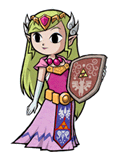 Young Zelda (Zelda: Minish Cap) |
 Young Zelda (Zelda: Ocarina of Time) |
 Zelda (Zelda: Link to the Past) |
 Zelda (Zelda: Ocarina of Time) |
In Super Smash Bros. 4
As a playable character
The Twilight Princess incarnation of Zelda reappears as a playable character in Super Smash Bros. 4. However, her overall color scheme is noticeably more vibrant because of SSB4's aesthetics.
Despite being a bottom-tier character in Brawl, Zelda received a mix of buffs and nerfs in the transition to SSB4. The most noticeable nerf is her separation from Sheik, who is now an entirely separate character. This nerf is further compounded both by the drastic buffs Sheik received in her own transition to SSB4, and Zelda's key flaws not being properly addressed. However, the buffs Zelda received are quite noticeable: her damage racking potential has improved, Farore's Wind is now a very potent KOing option, and she received a new down special called Phantom Slash that has utility as both an offensive and defensive attack.
In addition to these inherent buffs, Zelda received numerous buffs via game updates. These include increased damage outputs, improved multiple hit connectivity, decreased ending lag, and the removal of Phantom Slash's blind spot. The changes to shield mechanics also indirectly buffed her multiple hit moves and Lightning Kicks by making them safer on shield, and making her better at avoiding punishment. Although Zelda's strengths are largely outweighed by her weaknesses, she has nevertheless become slightly better than she was in Brawl. As such, Zelda is currently ranked 53rd out of 55 on the SSB4 tier list, placing her in the G tier (being tied with Ganondorf). In addition to being marginally better than her ranking in Brawl, SSB4's removal of the bottom-tier as of its third tier list also results in Zelda being assessed as a low-tier character like her ancestor is in Melee, rather than as a bottom-tier character like she was in Brawl.
A Zelda wig is also available as a headgear for all Mii Fighter types.
Trophies
- Zelda
This is the namesake of the Legend of Zelda games. Her appearance may change, but she always plays an important role. In Smash Bros., she's quick on the draw when it comes to magic, though a bit slow when moving. She has a new move that summons a Phantom to her aid.
This is the Zelda they're talking about in the titles of all the Legend of Zelda games. Though her appearance can change from game to game, her importance in the story usually doesn't. In this game, she's a bit slow, but her impressive magic skills make up for it. Power up her brand new special, Phantom Slash, by holding down the button.
- Zelda (Alt.)
Zelda's forward air attack, Lightning Kick, is a valiant kick with a magically charged tip. Striking with just the glowing spot will deal heavy damage and launch your opponent. Din's Fire, her explosive side special, can be guided up and down and has a greater blast if the button is held.
Zelda's forward air attack, Lightning Kick, is a single-footed, electrically charged strike. Hit your opponent with just the glowing spot to deal heavy damage and launch them. Her Din's Fire side special can be guided up and down, and makes a bigger blast the longer you hold the button. It'll explode as soon as you let go.
- Adult Zelda (Ocarina of Time)
In the seven years following Link's disappearance, Hyrule falls under the rule of the evil Ganondorf and Zelda grows into a young woman. To help Link in his quest to find the seven Sages, she takes on the guise of a young man named Sheik. The real identity of this mysterious helper is just one of the surprises awaiting Link.
In the seven years after Link's vanishing, Hyrule falls under the rule of the evil Ganondorf, and Zelda grows into a young woman. To help Link in his quest to find the seven Sages, she takes on the guise of a young man and becomes Sheik. The real identity of this mysterious helper is just one the surprises awaiting Link.
- Young Zelda (Ocarina of Time)
The Princess of Hyrule chosen by the goddesses. Zelda dreams of a darkness descending on Hyrule and tells Link where he must travel next. Fleeing Ganondorf, she gives Link the Ocarina of Time. It is seven long years before he is heard from again...
The Princess of Hyrule. Having dreamt of the world being engulfed by darkness, she asks Link for his help and tells him the secret to entering the Scared Realm. Later, while fleeing from Ganondorf, she frantically throws the Ocarina of Time for Link to take. Seven long years pass before the two meet again.
- Zelda (Spirit Tracks)
This Princess Zelda lives a suitably peaceful royal existence in Hyrule Castle. "Existence," however, is relative, and her life gets turned upside down after something awful happens along the way to the Tower of Spirits with Link. What will this spirited young woman do as only a spirit?!
This Princess Zelda lives a suitably peaceful royal existence in Hyrule Castle. "Existence," however, is relative, and her life gets turned upside-down when she heads to the Tower of Spirits with Link and something awful happens along the way. What will this spirited young woman do without her body?!
- Zelda's Spirit (Spirit Tracks)
- In The Legend of Zelda: Spirit Tracks, Chancellor Cole casts Zelda out of her body, so she agrees to join Link on his quest in her spirit form. On the plus side, Link (and you!) can still see and hear her as you explore temples together. She'll even possess a Phantom or two if it helps Link get the job done!
- Zelda (Wind Waker)
Princess Zelda plays a variety of roles throughout the games bearing her name. In the Wind Waker, she's a pirate who travels the seas without knowing her true identity. Even when she learns she's a princess, she quickly returns to her piratey ways. In the end, she takes up a bow to fight beside Link.
Princess Zelda has had quite a variety of incarnations, but this one doesn't even know she's a princess! When Link meets her, she's a wild and fearless pirate. In a certain sealed land, this Zelda discovers her true identity, but doesn't act like a princess for very long, and even fights alongside Link in the final showdown!
- Hooded Zelda
When a dark shadow invades Hyrule, Zelda sacrifices herself and is imprisoned in the world of Twilight. Her dark attire while a prisoner is appropriate to the title of the game, but Link's bravery convinces her to toss the robes and take up her bow and arrows instead.
After failing to protect Hyrule from the encroaching Twilight, Zelda lays down her sword and shield and hides behind a dark robe, mourning those who were lost due to her failure. In the end, Link's brave acts inspire her to cast the robe aside and take her bow in hand, but she never forgets the dark times when all hope seemed lost.
In Super Smash Bros. Ultimate
Zelda returns as a standalone playable character in Super Smash Bros. Ultimate. Zelda's design in this game is now based on her appearance in The Legend of Zelda: A Link Between Worlds, and has elements from her design in The Legend of Zelda: A Link to the Past. Zelda also received a new Final Smash, Triforce of Wisdom. As opposed to being a starter like in the other Smash Bros. games, Zelda is now an unlockable character.
Gallery
Princess Zelda's art from The Legend of Zelda: Ocarina of Time, which inspired her appearance in Melee.
- TPHD Zelda Artwork.png
Princess Zelda's art from the HD remake of The Legend of Zelda: Twilight Princess, which inspired her appearance in Brawl and SSB4.
Trivia
- When Zelda's design was being explained in Ultimate's E3 2018 trailer, the Japanese version said it was based on A Link to the Past while the English version, as well as her English blog post, said it was based on A Link Between Worlds. As there is no confirmation one way or the other, it is considered to be a combination of the two. However, in the English version of Palutena's Guidance on Zelda in Ultimate, she contradicts the E3 trailer and blog post by saying Zelda was the A Link to the Past version.
- Princess Zelda is one of two characters in the Super Smash Bros. franchise to be portrayed by a different incarnation of that character throughout the franchise, the other being Link: she is portrayed by her Ocarina of Time incarnation in Melee, her Twilight Princess incarnation in Brawl and Smash 4, and a hybrid between her A Link to the Past and A Link Between Worlds incarnations in Ultimate. Also, her Twilight Princess design is the only one of her different incarnations to appear in more than one game.
- Prior to Ultimate, Kirby's Zelda hat depicts him wearing Zelda's headdress when she is still a child despite being based on her adult design in Melee, and still wears it in both Brawl and Smash 4 despite Zelda now sporting her Twilight Princess design. However, in Ultimate Kirby's Zelda hat is redesigned so it resembles Zelda's hair in A Link to the Past and A Link Between Worlds, which is now used for her design in this game.
- Zelda is the only playable character in Smash to sport an alternate costume that would inspire her default design in a subsequent game: in this case, in SSB4 even though she reuses her Twilight Princess design from Brawl, she also has an alternate costume based on her appearances in A Link to the Past and A Link Between Worlds, which would become her default design in Ultimate. Consequently, her Twilight Princess design is reduced to a cameo appearance via an alternate costume in that game.
References
| Character Inspirations for Mii Fighter Costumes in Super Smash Bros. 4 | |
|---|---|
| Akira · Captain Falcon · Flying Man · Heihachi · Jacky · King K. Rool · Knuckles · Toad | |
| Ashley · Black Knight · Chrom · Dunban · Gil · Link · Lloyd · Monster Hunter · Takamaru · Viridi · Zero | |
| Fox · Geno · Inkling · Isabelle · K.K. Slider · MegaMan.EXE · Proto Man · Samus · Tails · X | |
| Headgear only | Barbara · Chain Chomp · Chocobo · Daisy · Inkling Squid · Luigi · Majora's Mask · Mario · Meta Knight · Peach · Red Shell · Sheik · Shy Guy · Spiny · Super Mushroom · Waluigi · Wario · Zelda |
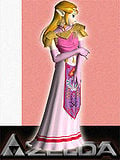

![Smash trophy [Adventure Mode]](https://ssb.wiki.gallery/images/thumb/a/a1/Princess_Zelda_Trophy_%28Smash%29.png/84px-Princess_Zelda_Trophy_%28Smash%29.png)
![Smash trophy [All-Star Mode]](https://ssb.wiki.gallery/images/thumb/5/56/Princess_Zelda_Trophy_2_%28Smash%29.png/120px-Princess_Zelda_Trophy_2_%28Smash%29.png)
